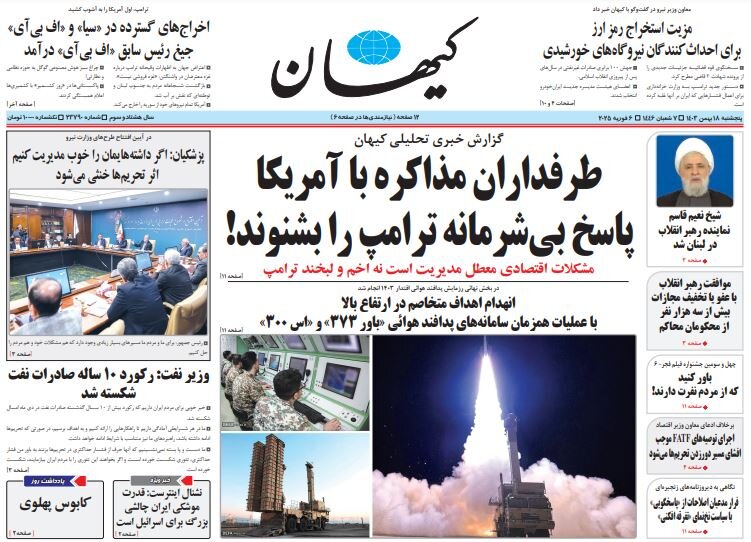Iran's missile power is a major challenge for Israel

TEHRAN - In a commentary, Kayhan discussed a report by the American magazine National Interest about Iran's missile arsenal and said: The Revolution Guard Navy unveiled a new underground missile base in the southern coastal region.
Iran's missile arsenal has expanded significantly over the past decade. Over the past few years, the IRGC has specifically used these missiles to attack ISIS positions in Syria, and the positions of terrorist separatist groups in the Iraqi Kurdistan. But what was more important is that Iranian-backed groups in the region, including Hezbollah in Lebanon, Hamas in Gaza, and the Houthis in Yemen, have benefited from Iran's expanding missile arsenal. Iran's weapons stockpile now includes high-precision guided ballistic missiles, drones, and cruise missiles. Such weapons allow Iran to target American military ships in the Sea of Oman and the Persian Gulf. Of course, we should not forget the Strait of Hormuz, through which one-fifth of the world's oil passes and is constantly under the control of Iran, whether through missiles or other asymmetrical tactics. As tensions in the Middle East escalate, Tehran's missile capabilities are becoming a greater challenge for the United States and Israel.
Iran: Negotiation and resistance, Iran’s formula against Trump
In an analysis of Trump's second maximum pressure order, the Iran newspaper wrote: Donald Trump has declared that Iran cannot have nuclear weapons but he wants a “verified nuclear peace agreement” with Iran, and the United States must immediately begin working on it. The United States has also tried to limit Iran's oil revenues for decades but has never been able to completely freeze its exports. These oil cargoes are transported by a fleet known as the "Ghost Fleet" outside American control and evade Western banking and insurance services. Oil experts believe it is difficult for Trump to zero Iran's oil exports. On the other side, if Trump tries to impose limitations on Iran's ballistic missile program in his proposed agreement, Tehran will probably not accept it. Saeed Laylaz, a political and economic expert, says though Iran is ready to negotiate, it is ready to resist Trump if necessary.
Sobh-e-No: Saboteurs are fighting each other
In an article, Sobh-e-No dealt with the conflict between foreign-based opposition groups and wrote: According to the latest news, freezing the funds to the opposition groups by the U.S. government has caused physical and verbal conflicts among them. The monarchists insult the leftists and the intellectuals boast against the monarchists. They were waiting for Trump to come to power so that they could “attack” Iran, but they were shocked in the early days of his administration, and Trump froze the funding for them in his first executive order. At the same time, the list of some of the recipients of the dollars has come out and worried them, and now the anti-revolution groups are fighting each other and making revelations against each other. Ataollah Mohajerani, (a former Iranian culture minister and history professor now living in London), Trump destroyed the world of the saboteurs. They thought that with the arrival of Trump and the Trump-Netanyahu alliance, the Islamic Republic would be finished, but Trump has distanced himself significantly from them. Will this move cause the saboteurs to rethink their policies? It is unlikely because if they had been smart enough, they would not have reached this point.
Hamshahri: I prefer an agreement with Iran
On Trump's new message that he wants an agreement with Iran, Hamshahri wrote: In a message, the U.S. President announced his readiness to reach a verifiable agreement with Iran on its nuclear program by saying that he wants Iran to be a successful country. Trump said that he wants Iran to be a wonderful and successful country, but one that does not have nuclear weapons. Trump believes that we should work on this issue immediately and hold a big celebration in the Middle East when it is finalized and signed. The repeated claim that Iran seeks military goals under cover of its nuclear program comes as officials in Iran have repeatedly emphasized that despite high capacity to enrich uranium, the production and use of nuclear weapons have no place in Iran's nuclear program. Iran's nuclear program has been subject to one of the most stringent monitoring and verification programs of the International Atomic Energy Agency, which has not yet confirmed the veracity of this claim.
Leave a Comment